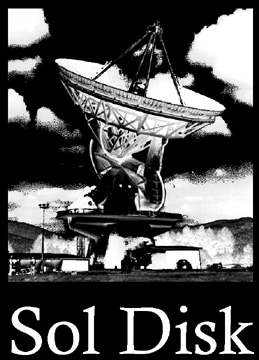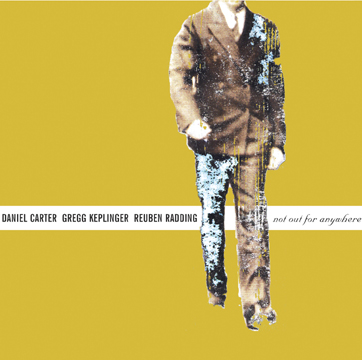Daniel Carter/Gregg Keplinger/
Reuben Radding
Not Out For Anywhere
Reviews
Carter / Keplinger / Radding
Not Out For Anywhere
(Sol Disk)
tasteful insertion of the occasional arrhythmic punctuation, repeated in the sharp, detached style of late Trane, only hints at his versatility and rhetorical assimilation. "It's the End" functions along similar lines, Keplinger's melodic drum solo giving rise to broad modal explorations.
passages were composed. The ease with which both solos and collective playing coexist speaks to experience bordering on the telepathic.
synchronicity between Carter and Radding. After such a calm, slightly cold space in which to exist, the sudden jolt into the relative chaos of "This Means No" is jarringly effective.
fact that Carter switches from saxes to trumpet to flute, as on disc one, often renders soloist identification more difficult, but this is hardly the point.
Marc Medwin, One Final Note, 11 April 2005
Not Out for Anywhere
Daniel Carter/Gregg Keplinger/Reuben Radding Sol Disk
Daniel Carter's collaboration with bassman Reuben Radding has evolved from an impressionistic alto sax and contrabass duo on Luminescence (AUM Fidelity, 2003) to an alto/bass/drum trio with the addition of Gregg Keplinger on Language (Origin, 2002) and now to the trio supplemented by Carter's full range of instrumentation and other musicians forming what they call the Large Group.
Divided into a two-disc set, Not Out for Anywhere offers a lot of music. Disc one presents the trio in characteristic improvisations featuring Carter's own profound explorations, Keplinger's active drumming, and Radding's enthralling arco and pizzicato work. Radding plays his bass deep, in a seemingly continuous low rumble that offsets Keplinger's cymbals. Radding sounds like a bowling alley heard from outside and Keplinger's drums crash like ricocheting pins. Whether using his fingers or a bow, Radding is the fulcrum for the trio, slowing down and speeding up as warranted, often right in the middle of a song. On "Still I" he gets a marvelous woody sound as he bounces the strings lightly off the neck, perfectly complementing Carter's clarinet. In addition to clarinet, Carter chiefly plays alto, the middle-to-upper range of his tenor, flute on "Same Thing as That," and most impressively, introverted, disembodied trumpet on "Commercial Break" and "And One Guy Yells Piano."
Disc two adds guitar, piano, three saxophones, and four percussionists to the core to form a twelve piece Large Group on two extended jams. "Psycho Scrim" kicks off with a free jazz fanfare and gradually instruments peel away, leaving soloists and duos to carry the tune. Radding pulls out and puts away his bow and Carter swaps horns from his arsenal before the chorus of saxes returns to lead the ensemble to its conclusion. The longer "No Name Ocean" repeats the improvisational concept, but by the time Radding emerges to lay down a groove, the pianist comps and the bells get shaken, it sounds like a Pharoah Sanders project. Whatever the configuration, Carter, Keplinger, and Radding make formidable music.
Jeff Stockton, All About Jazz: New York, May 04, 2005
Daniel Carter / Gregg Keplinger / Reuben Radding - Not Out for Anywhere
Niejaki Daniel Carter jest nieobliczalny. Ale to już wiem. Kiedy po raz pierwszy usłyszałem go na żywo w trakcie koncertów tria Carter/Blumenkrantz/Zubek, czyli Chinatown Trio doszło to do mnie w sposób, który przeszył mnie od stóp do głów i z powrotem. Od tego czasu wiem, że cokolwiek, czego się nie chwyci przerodzi się w Muzykę!
Obojętnie jaka to będzie formuła. A podstawą dla jego gry może być dosłownie wszystko. Wydaje się, że mógłby grać czeskie polki, czy z Marylą Rodowicz, a i tak muzyka stałaby się muzyką Cartera. Nawet, jeśli nie grałby w niej pierwszych skrzypiec. Carter jest skromny i pokorny. Nie narzuca się. On inspiruje. Dopasowuje się, a potem podaje pomysły. Wydany nakładem Sol Disk dwupłytowy album firmowany przez trio Daniel Carter, Gregg Keplinger i Reuben Radding, jest kolejnym - tym cenniejszym, że nowym - krążkiem, na którym zaprezentowane zostały wizje muzyki by Daniel Carter.
Pierwsza płyta, to zapis muzyki nagranej jedynie przez trio firmujące album. W zasadzie dostajemy tu to, do czego takie składy, jak choćby z Keplingerem i Reddingiem, czy Chinatown (w wersji płytowej) nas przyzwyczaiły. Dla mnie, stosunkowym zaskoczeniem była gra Cartera na trąbce. Liryczna, introwertyczna, davisowska w brzmieniu i frazie. Odnotować na pewno trzeba również utwór zagrany na flecie. Ponownie liryzm, ale akurat zwykle używając tego instrumentu Carter jest liryczny. Saksofony to całe spektrum możliwości od cichych, ledwie słyszalnych dźwięków, po niemal dziką furię. Wrzask.
Druga płyta prezentuje trio w otoczeniu dziewięciu innych muzyków, a zespół przyjął nazwę Large Group. Ciekawostką może być, że dwunastoosobowa komanda liczy aż pięciu muzyków grających na instrumentach perkusyjnych. Tym razem muzyka jest chyba jeszcze bardziej zróżnicowana niż na pierwszej płycie. Swing, free, fragmenty jakby hard core mieszają się ze sobą jak we flashowej prezentacji. Ukojenie przynosi "No Name Ocean", w dużej mierze transowy, długi utwór kończący muzyczną prezentację. Muzycy zabierają w podróż ku nirwanie.
Kolejna dobra płyta współfirmowana przez Daniela Cartera. Biorąc pod uwagę, że od przełomu wieku muzyk ten nagrał więcej płyt, niż przez wcześniejsze 30 lat swej aktywności, a stał się legendą free i loftu za życia, nie pozostaje nic innego jak tylko się cieszyć. Niestety klimat muzyki granej przez saksofonistę w latach 70. i 80. odszedł bezpowrotnie. Nie ma niemal żadnych rejestracji. Nawet nielegalnych, bootlegowych. Teraz mamy już muzykę niemal nestora free. Kiedyś przeczytałem gdzieś zdanie, że jego improwizowanie w najpełniejszy sposób odzwierciedla ducha naszych czasów. Nie znam czasów Nowego Jorku przełomu wieków. Jedynie z opowieści. Z przekazów TV. Obraz ten jawi się, jako obraz skrajności. Biedy i bogactwa. Niefrasobliwej zabawy i wielkiej tragedii. W istocie, w muzyce Cartera można wszystko to usłyszeć. Recenzent miał rację? Wciąż jednak, wydaje mi się, że ów prawdziwy Carter powstaje, kreuje się dopiero na oczach słuchaczy podczas koncertów. Nic niestety nie jest tego w stanie oddać. Szkoda.
Dla porządku tego peanu pochwalnego na rzecz Cartera muszę (i chcę) oddać też sprawiedliwość pozostałym muzykom. Sekcja gra wspaniale. Szczególnie w uszy i pamięć zapadł mi Reuben Radding (kolejny już raz), który jest zupełnie niepospolitym basistą, potrafiącym w muzyce na wskroś jazzowej, akompaniować zupełnie wydawałoby się nie przystojącym do niej sposobem gry, przywodzącym niekiedy np. zespoły rockowe bardziej niż cokolwiek innego. Tym niemniej jednak Large Group, w przeciwieństwie do tego do czego przywykliśmy w tak dużych składach, niemal nie jest możliwym wyróżnienie kogokolwiek. Muzycy tworzą jednolitą grupę, nie siląc się niemal na popisy solowe. A choć i takie bywają, to jednakże pozostaje wrażenie gry całego zespołu, a nie solówek wyrywających się przed orkiestrę.
Paweł Baranowski, Dia Pa Zon, 2005-07-18, Poland
DANIEL CARTER, GREGG KEPLINGER, REUBEN RADDING
NOT OUT FOR ANYWHERE
SOL DISK 5703
Dance At the Beach / Same Thing As That / It's Just No, But Then / Commercial Break / Still I / And One Guy Yells Piano / The Long 7 / It's the End / Psycho Scrim / No Name Ocean. 100:57.
Daniel Carter, rds, tpt, fl; Gregg Keplinger, d; Reuben Radding, b; Rick Mandyck, g; Gust Burns, p; Wally Shoup, as; Steve Griggs, ts; Adam Diller, ts; Dave Coleman, perc; Matt Crane, perc; Jack Gold, perc; Troy Tiejen, perc. May 10-11, 2003, Seattle, WA
Frank Rubolino, Cadence, August 2005

